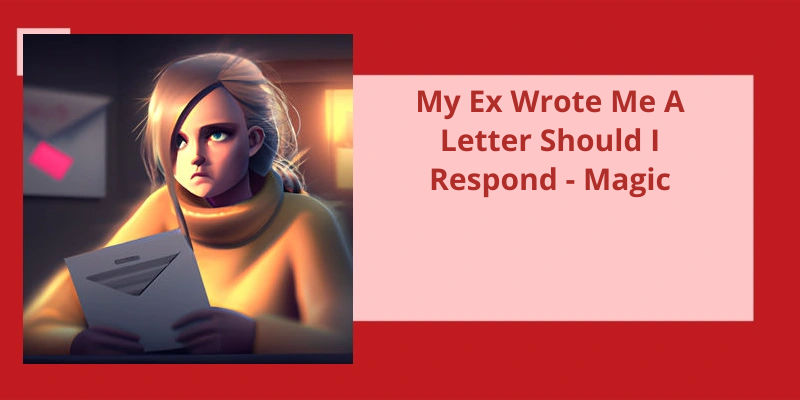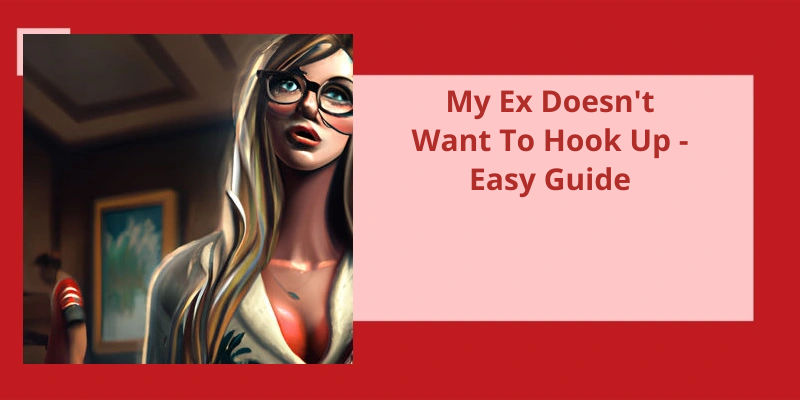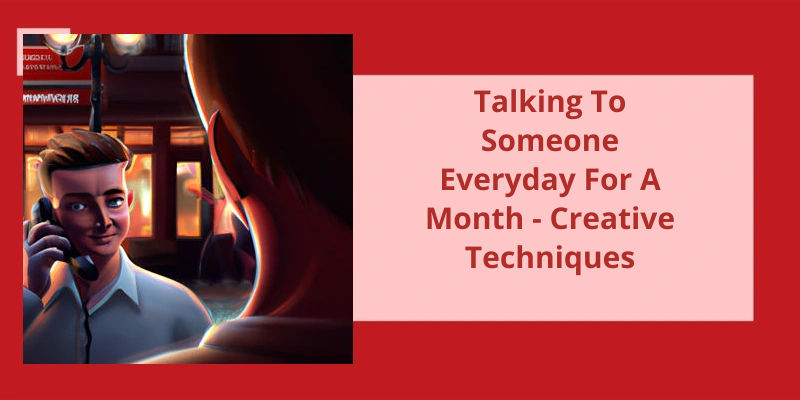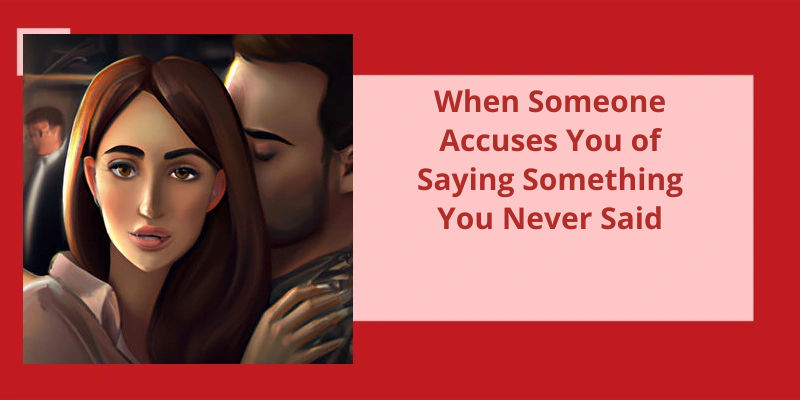Breaking up with someone can be one of the most challenging and emotionally draining experiences a person can go through. When an ex-partner reaches out unexpectedly, sending a letter expressing their thoughts and feelings, it can be a moment filled with a whirlwind of emotions and uncertainty. As you hold their words in your hands, you may find yourself questioning whether you should respond or not. Should you give them your time and attention, or is it best to leave the past in the past? The decision to respond to your ex's letter is a deeply personal one, and it’s important to consider various factors, such as your current emotional state, the nature of your relationship, and your ultimate goals moving forward. With this in mind, it may be helpful to explore the notion of magic in relation to this situation. Magic has always captivated human imagination, promising the power to bend reality and create extraordinary outcomes. Similarly, responding to your ex's letter can be seen as an opportunity to create a magical moment of healing and closure, or it may prove to be a dangerous dance with the past that stirs up old wounds. By exploring the different aspects of this situation and considering the power of magic in your own life, you can chart a course that aligns with your own personal well-being and happiness.
Does Writing a Letter to Your Ex Help?
When it comes to the idea of writing a letter to your ex, the decision ultimately rests with you. Exchanging letters back and forth about what went wrong and how it made you feel might bring you a sense of closure, as it can serve as a way for both parties to express themselves and offer apologies or explanations. By putting your thoughts and emotions on paper, you might find that you’re able to process your feelings in a more coherent and constructive manner.
Additionally, writing a letter to your ex might also provide an opportunity for both of you to gain a deeper understanding of the situation. By reflecting on what went wrong and communicating your perspectives, you could unearth insights that were previously hidden, allowing for a clearer understanding of the relationships complexities. This understanding may foster empathy and compassion, softening the negative feelings that may have contributed to the breakup.
However, it’s important to approach this letter exchange with caution. While it can be helpful for some, there’s also a risk that writing letters could reignite feelings and ultimately lead to wanting to get back together. It’s essential to consider whether getting back together is truly what you want and whether the issues that led to the breakup have been resolved or can be resolved in a healthy way. It’s crucial to prioritize your emotional well-being and consider the potential consequences that may arise from reopening communication.
Ultimately, responding to a letter from your ex depends on your current emotional state and your true intentions. Take time to reflect on your feelings and carefully evaluate whether engaging in this exchange would be beneficial for your healing process. If you feel that it could provide closure or facilitate a healthy understanding of the past, responding may be a positive step forward. However, it’s important to be honest with yourself about your motivations and make choices that align with your long-term happiness and well-being.
The Potential Risks of Writing a Letter to Your Ex
- Reopening old wounds
- Stirring up unresolved emotions
- Feeding false hope or expectations
- Inviting further heartache or rejection
- Creating confusion and mixed signals
- Putting your mental and emotional well-being at risk
- Potential damage to current relationships or friendships
- Triggering negative behavior or retaliation
- Opening doors to communication that may be better left closed
- Prolonging the healing process and preventing moving on
Many individuals contemplate the idea of sending a closure letter to their ex after a breakup, hoping it will provide a sense of resolution and finality. However, experts suggest that if you decide to go down this path, it’s essential to do so promptly. Waiting weeks or even months before sending such a letter may indicate that the lingering feelings aren’t properly addressed, making it ineffective and possibly unnecessary. With that said, it’s crucial to carefully evaluate whether this step is truly beneficial for your emotional well-being.
Should I Send My Ex a Letter for Closure?
When it comes to navigating the aftermath of a breakup, one question that frequently arises is whether or not to send a letter to an ex for closure. Many people believe that a closure letter can provide a sense of relief and help in moving on, while others argue that it may only reopen old wounds. The timing of such a letter is crucial, as sending it too late can derail the healing process.
Instead of relying solely on a letter for closure, consider focusing on other avenues of self-healing. Seek support from friends or a therapist who can provide objective guidance during this challenging phase. Engage in self-reflection to understand your own emotions and triggers better. Participating in activities that bring you joy and practicing self-care can also aid in the healing process.
Tips for Effectively Communicating Your Feelings and Achieving Closure in a Breakup Without Relying on a Letter
- Express your emotions through open and honest conversations
- Listen actively and be attentive to your partner’s perspective
- Avoid blame and focus on expressing your own feelings
- Use “I” statements to express your emotions and avoid sounding accusatory
- Find a neutral and comfortable setting for discussions
- Be respectful and avoid name-calling or insults
- Give each other space and time to process emotions
- Seek professional help like counseling if necessary
- Avoid relying on a letter as the sole means of communication
- Consider writing a letter as a personal reflection, but use other methods to communicate with your partner
- Use body language and non-verbal cues to express your emotions
- Focus on finding closure within yourself and not solely relying on your partner
- Be patient with the process of healing and closure
- Remember to take care of yourself physically, emotionally, and mentally
Source: I needed closure with my ex so I wrote a letter and emailed …
Giving yourself space and time after a breakup is crucial for healing and self-improvement, especially if you’re considering reaching out to your ex. The no contact rule is a recommended approach that allows you to focus on personal growth and recovery before attempting to revive a healthy connection.
Should I Write My Ex After Breakup?
Going through a breakup can be a difficult and emotionally challenging time. One of the common dilemmas people face during this period is whether they should reach out to their ex or not. While it’s completely natural to feel tempted to write them a letter or a text, it’s important to give yourself some space and time before doing so.
The no contact rule is often recommended in situations like these. This means no communication with your ex for a specific period of time, usually around 30 days. The purpose of this rule is to allow yourself to heal from the breakup and focus on self-improvement. It gives you the opportunity to understand your emotions, reflect on the relationship, and work on personal growth.
Taking this time away from your ex can help you gain clarity and perspective on the situation. It allows you to evaluate whether reaching out to them is truly what you want or if it’s just a knee-jerk reaction to the emotions youre feeling. It’s important to remember that getting back into a healthy relationship requires both parties to be in a good emotional state and ready to work on the issues that led to the breakup.
During this no contact period, it’s crucial to focus on self-care and self-improvement. Invest your time and energy in activities that bring you joy and fulfillment. Reconnect with friends, pursue hobbies, and work on personal goals to boost your self-esteem and confidence. This won’t only help you heal but also make you more attractive and independent, which can be beneficial if you do decide to reach out to your ex in the future.
Ultimately, the decision of whether or not to write your ex after a breakup is a personal one. It’s important to trust your instincts and do what feels right for you. However, giving yourself the space and time to heal before reaching out is generally recommended to ensure that youre in a good emotional state and approaching the situation with a clear mind. Remember, your happiness and well-being should always be a priority, so take the necessary steps to prioritize your own healing and growth.
How to Determine if Reaching Out to Your Ex Is Productive or Harmful
When considering whether to respond to a letter from your ex, it’s important to evaluate the potential outcomes. Reaching out can be productive if you both have clear intentions for communication, such as closure or reconciliation. However, it can also be harmful if it stirs up negative emotions, triggers old wounds, or leads to further heartache. Consider your emotional readiness, the reasons behind the breakup, and the potential impact on your well-being before making a decision. It may be helpful to consult with trusted friends or a therapist to gain perspective before responding.
Navigating communication with an ex can be delicate territory, and deciding whether or not to respond to a text from them is a subjective matter. Factors such as the nature of the breakup and the emotional impact it had on you can play a significant role in determining the right course of action. While ignoring a text from an ex might provide emotional peace and personal wellbeing in toxic relationships, it may not be an issue to respond if the separation was amicable.
Is It Bad to Not Respond to a Text From an Ex?
However, when it comes to receiving a letter from your ex, the situation may warrant a different approach. A letter indicates that your ex has taken the time and effort to express their thoughts and feelings to you in a more personal and reflective way. It shows a level of vulnerability that should be acknowledged.
Before making a decision, take a moment to assess how you currently feel about the situation. Are you still harboring negative emotions? Or have you moved on and healed from the past? Understanding your own emotional state is crucial in determining whether or not you should respond.
Another important factor to consider is the content of the letter itself. Does it hold any significance in your life? Is it addressing unresolved issues or offering genuine apologies and reconciliation? If the letter seems sincere and has the potential to bring closure or improve your relationship in some way, then it may be worth responding. However, if it feels manipulative or attempts to reopen old wounds, it may be best to maintain your distance.
Establishing boundaries is also vital in this situation. If you choose to respond, make it clear that you’re open to communication within specific limits. This helps prevent any potential confusion or false hopes from arising. You deserve to protect your own emotional wellbeing, and establishing boundaries can aid in that process.
Trust your instincts and prioritize your own emotional well-being. Consider seeking support from trusted friends, family, or a therapist to gain additional perspectives and guidance. Remember, responding or not responding both have their own potential consequences, so choose what feels right for you in the present moment.
The Importance of Setting Boundaries With an Ex After a Breakup
After a breakup, it’s crucial to establish clear boundaries with your ex-partner. Setting boundaries helps in maintaining emotional well-being and facilitating the healing process. It allows you to move forward and create space for personal growth.
By setting boundaries, you’re sending a clear message that you respect your own needs and emotions. It helps in avoiding unnecessary confusion, pain, and potential rekindling of feelings that may not be healthy for either party.
Responding to a letter from your ex requires careful consideration. Before making a decision, take time to reflect on your own emotions and intentions. Ask yourself if responding aligns with your healing process and if it could potentially lead to more heartache or confusion.
Remember, you’ve the right to prioritize your well-being. If engaging with your ex feels uncomfortable or brings up negative emotions, it may be best to refrain from responding. Focus on self-care, surrounding yourself with support, and working through your own healing journey.
Overall, setting boundaries with an ex-partner plays a vital role in moving forward after a breakup. It allows you to prioritize your own emotional well-being and create a healthy environment for growth and healing.
Acknowledge the pain and disappointment you experienced in the relationship, and express any lingering sadness or anger you may feel. This closure letter is an opportunity for you to let go of any unresolved emotions and find a sense of closure on your own terms.
How Do You Write a Closure Letter After a Break Up?
Expressing your emotions in a closure letter is crucial for healing. Allow yourself to be vulnerable and let your ex know how their actions affected you. Share the pain, anger, and heartbreak that you experienced during the relationship and after the breakup. This honesty will help you release any pent-up emotions and provide you with a sense of closure.
In addition to expressing your emotions, it’s important to communicate what you wanted and needed from the relationship that you didn’t receive. This allows you to assert your needs and helps you identify what you should look for in future relationships. Be clear and direct in your letter, and avoid blaming or attacking your ex. Instead, focus on your own experiences and how their actions impacted you.
Saying goodbye in your closure letter is an essential part of the process. It allows you to acknowledge that the relationship is over and helps you mentally and emotionally detach. Express your gratitude for the positive aspects of the relationship, and also acknowledge any personal growth or lessons learned. By saying goodbye, you’re giving yourself permission to move forward and start a new chapter of your life.
Deciding whether or not to respond to a closure letter from your ex can be challenging. Consider your motivations and intentions before making a decision. If you genuinely believe that responding will bring you closure and help you move on, then it may be worth considering. However, if you think it may reopen old wounds or hinder your healing process, it might be best to abstain from responding.
Ultimately, the decision to respond or not should be based on what feels right for you. Take your time to reflect on your emotions and consider seeking support from trusted friends or a therapist. Remember, closure is a personal journey, and you’ve the power to determine what actions will best serve your healing process.
This can lead to various reactions from your ex, such as increased persistence or resorting to different tactics to grab your attention. It’s important to understand the potential consequences of not replying to your ex, as it can impact the dynamics of your post-breakup relationship.
What Happens When You Don’t Reply to Your Ex?
When you don’t respond to your exs letter, youre signaling a clear boundary that youre not interested in engaging in further communication. This can leave your ex feeling confused, frustrated, and even desperate to regain your attention. They may resort to different tactics to try and get you to respond, such as sending multiple messages, calling you, or even showing up at your doorstep unannounced.
By not responding, you’re essentially detaching yourself from the toxic cycle that may have existed in your past relationship. It allows you to regain control over your own emotions and create space for healing and growth. It may feel difficult at first, especially if you still have lingering feelings for your ex, but this decision can ultimately lead to a healthier and happier future.
Additionally, not responding gives you time to reflect on the reasons why the relationship ended and whether or not reconnecting is truly in your best interest. It allows you to prioritize your own well-being and evaluate if your ex has genuinely changed or if they’re simply looking for validation or a temporary fix. Taking this time for yourself can lead to a clearer perspective on the situation and prevent you from falling into the same patterns that led to the breakup.
Moreover, not responding can serve as a form of self-respect and self-preservation. It communicates that you value yourself enough to not engage in unnecessary drama or reopen wounds that have already started to heal. It sets a precedent that you won’t tolerate being treated poorly or manipulated into a situation that may not be healthy for you.
Ultimately, the decision to respond or not to your exs letter is entirely up to you. It’s important to consider your own emotional well-being and whether reopening lines of communication would truly be beneficial for you. Sometimes, not responding can be the best choice in order to protect yourself and promote personal growth. Trust your instincts and prioritize your own happiness above all else.
The Potential Consequences of Responding to an Ex’s Letter
When considering whether to respond to a letter from an ex, it’s important to think about the potential consequences. While it may seem tempting to rekindle old emotions or revisit the past, it’s essential to evaluate the reasons behind wanting to respond. It’s crucial to consider whether engaging in communication with an ex can lead to unresolved feelings, confusion, or even reopening old wounds. Reflect on the state of your own emotional well-being and the possibility of misinterpreted intentions before deciding to respond. Remember, prioritizing your own happiness and moving forward should be the main goal when dealing with past relationships.
Conclusion
In the realm of relationships, moments of uncertainty often arise, leaving us pondering whether to respond when our ex writes us a letter. It’s natural to question if engaging in further communication is the right path to choose. However, one must assess the intentions behind the letter and carefully evaluate their own emotional well-being before making a decision. In doing so, we heed the importance of self-care and healing the wounds of the past. Magic lies not in responding or not, but in the power we hold to write our own narrative and embark on a journey toward self-discovery. Ultimately, the choice to respond or not lies within us, but it’s essential to prioritize our own growth and happiness above all else.






